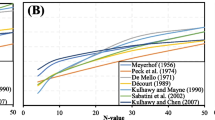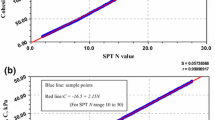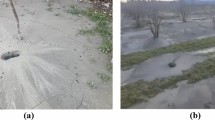Abstract
The secondary consolidation settlement occurs in soft-grained soils after the primary consolidation settlement. This settlement affects the serviceability performance of surface and buried structures in the long term, and thus, it is necessary to evaluate it in the design. The secondary consolidation settlement is calculated using the secondary compression index. However, there is a lack of studies on the development of robust models that could be used with confidence to predict the compressibility index without the need to perform consolidation tests. In this paper, original models have been developed to accurately predict the secondary compression index using an advanced data-driven method. The accuracy of the original models has been examined based on a statistical accuracy assessment methodology. It has been found that three of the new models provide accurate prediction, as they scored low overall error and high cumulative frequency at low error. Also, these models scored a high coefficient of determination. Importantly, the new original models outperformed the available simple empirical correlations in the literature. The outcome of the papers is useful to design engineers who conduct settlement assessments of structures built on soft, fine-grained soils.







Similar content being viewed by others
Availability of data and material
The data and materials in this paper are available.
References
Abbaspour-Gilandeh M, Abbaspour-Gilandeh Y (2019) Modelling soil compaction of agricultural soils using fuzzy logic approach and adaptive neuro-fuzzy inference system (ANFIS) approaches. Model Earth Syst Environ 5:13–20. https://doi.org/10.1007/s40808-018-0514-1
Ahangar Asr A, Javadi AA (2020) Effective stress parameter in unsaturated soils: an evolutionary-based prediction model. Proc Instit Civ Eng Smart Infra Constr 173:96–105. https://doi.org/10.1680/jsmic.21.00012
Al-Khafaji AWN, Andersland OB (1992) Equations for compression index approximation. J Geotech Eng 118:148–153. https://doi.org/10.1061/(ASCE)0733-9410(1992)118:1(148)
Altomare C, Laucelli DB, Mase H, Gironella X (2020) Determination of semi-empirical models for mean wave overtopping using an evolutionary polynomial paradigm. J Mar Sci Eng 8(8):570
Alzabeebee S, Al-Taie A (2022) Development of new models to predict the compressibility parameters of alluvial soils. Geomech Eng 30:437–448. https://doi.org/10.12989/gae.2022.30.5.437
Alzabeebee S, Alshkane YM, Al-Taie AJ, Rashed KA (2021a) Soft computing of the recompression index of fine-grained soils. Soft Comput 25:15297–15312. https://doi.org/10.1007/s00500-021-06123-3
Alzabeebee S, Alshkane YM, Rashed KA (2021b) Evolutionary computing of the compression index of fine-grained soils. Arab J Geosci 14:1–17. https://doi.org/10.1007/s12517-021-08319-1
Asare EN, Affam M, Ziggah YY (2023) A hybrid intelligent prediction model of autoencoder neural network and multivariate adaptive regression spline for uniaxial compressive strength of rocks. Model Earth Syst Environ. https://doi.org/10.1007/s40808-023-01717-2
Bhagowati B, Talukdar B, Narzary BK et al (2022) Prediction of lake eutrophication using ANN and ANFIS by artificial simulation of lake ecosystem. Model Earth Syst Environ 8:5289–5304. https://doi.org/10.1007/s40808-022-01377-8
Cherif K, Yahia N, Bilal B et al (2023) Erosion potential model-based ANN-MLP for the spatiotemporal modeling of soil erosion in wadi Saida watershed. Model Earth Syst Environ. https://doi.org/10.1007/s40808-022-01657-3
Das BM (2016) Principles of foundation engineering. Cengage learning, Boston
Gashaw NA, Assefa E, Sachpazis C (2022) Consolidation parameters conceptualization using regression analysis and genetic programming for Addis Ababa’s red clay soils. Model Earth Syst Environ 8:1087–1098. https://doi.org/10.1007/s40808-021-01127-2
Huang CF, Li Q, Wu SC, Liu Y, Li JY (2019) Assessment of empirical equations of the compression index of muddy clay: sensitivity to geographic locality. Arab J Geosci 12:1–13. https://doi.org/10.1007/s12517-019-4276-5
Jin YF, Yin ZY, Zhou WH, Yin JH, Shao JF (2019) A single-objective EPR based model for creep index of soft clays considering L2 regularization. Eng Geolo 248:242–255. https://doi.org/10.1016/j.enggeo.2018.12.006
Kassim KA, Rashid ASA, Kueh ABH, Yah CS, Siang LC, Noor NM, Moayedi H (2015) Development of rapid consolidation equipment for cohesive soil. Geotech Geol Eng 33:167–174. https://doi.org/10.1007/s10706-014-9819-7
Koppula SD (1981) Statistical estimation of compression index. Geotech Test J. https://doi.org/10.1520/GTJ10768J
Kurnaz TF, Dagdeviren U, Yildiz M, Ozkan O (2016) Prediction of compressibility parameters of the soils using artificial neural network. Springerplus 5:1–11. https://doi.org/10.1186/s40064-016-3494-5
Laucelli D, Giustolisi O (2011) Scour depth modelling by a multi-objective evolutionary paradigm. Environ Model Softw 26(4):498–509
Li Q, Ng CWW, Liu GB (2012) Low secondary compressibility and shear strength of Shanghai Clay. J Cent South Univ 19:2323–2332. https://doi.org/10.1007/s11771-012-1278-9
Mandhour EA (2020) Prediction of compression index of the soil of Al-nasiriya city using simple linear regression model. Geotech Geol Eng 38:4969–4980. https://doi.org/10.1007/s10706-020-01339-w
Marasco S, Fiore A, Greco R, Cimellaro GP, Marano GC (2021) Evolutionary polynomial regression algorithm enhanced with a robust formulation: application to shear strength prediction of RC beams without stirrups. J Comput Civil Eng 35(6):04021017
Mohammadzadeh D, Bazaz JB, Alavi AH (2014) An evolutionary computational approach for formulation of compression index of fine-grained soils. Eng App Artif Intel 33:58–68. https://doi.org/10.1016/j.engappai.2014.03.012
Mohammadzadeh SD, BolouriBazaz J, Vafaee Jani Yazd SH, Alavi AH (2016) Deriving an intelligent model for soil compression index utilizing multi-gene genetic programming. Environ Earth Sci 75:1–11. https://doi.org/10.1007/s12665-015-4889-2
Mohammadzadeh SD, Kazemi SF, Mosavi A, Nasseralshariati E, Tah JH (2019) Prediction of compression index of fine-grained soils using a gene expression programming model. Infrastructures 4:26. https://doi.org/10.3390/infrastructures4020026
Nakase A, Kamei T, Kusakabe O (1988) Constitutive parameters estimated by plasticity index. J Geotech Eng 114:844–858. https://doi.org/10.1061/(ASCE)0733-9410(1988)114:7(844)
Nassr A, Esmaeili-Falak M, Katebi H, Javadi A (2018) A new approach to modeling the behavior of frozen soils. Eng Geol 246:82–90. https://doi.org/10.1016/j.enggeo.2018.09.018
Nguyen DK, Nguyen TP, Ngamkhanong C, Keawsawasvong S, Lai VQ (2023) Bearing capacity of ring footings in anisotropic clays: FELA and ANN. Neural Comput Appl. https://doi.org/10.1007/s00521-023-08278-6
Ozer M, Isik NS, Orhan M (2008) Statistical and neural network assessment of the compression index of clay-bearing soils. Bull Eng Geol Environ 67:537–545. https://doi.org/10.1007/s10064-008-0168-8
Park HI, Lee SR (2011) Evaluation of the compression index of soils using an artificial neural network. Comput Geotech 38:472–481. https://doi.org/10.1016/j.compgeo.2011.02.011
Rashed KA, Salih NB, Abdalla TA (2017) Correlation of consistency and compressibility properties of soils in Sulaimani city. Sul J Eng Sci. https://doi.org/10.17656/sjes.10061
Samui P, Hoang ND, Nhu VH, Nguyen ML, Ngo PTT, Bui DT (2019) A new approach of hybrid bee colony optimized neural computing to estimate the soil compression coefficient for a housing construction project. Appl Sci 9:4912. https://doi.org/10.3390/app9224912
Vinod P, Bindu J (2010) Compression index of highly plastic clays—an empirical correlation. Indian Geotech J 40:174–180
Wu C, Hong L, Wang L, Zhang R, Pijush S, Zhang W (2022) Prediction of wall deflection induced by braced excavation in spatially variable soils via convolutional neural network. Gondwa Res. https://doi.org/10.1016/j.gr.2022.06.011
Yin JH (1999) Properties and behaviour of Hong Kong marine deposits with different clay contents. Can Geotech J 36:1085–1095. https://doi.org/10.1139/t99-068
Yin ZY, Xu Q, Yu C (2015) Elastic-viscoplastic modeling for natural soft clays considering nonlinear creep. Int J Geomech 15:A6014001. https://doi.org/10.1061/(ASCE)GM.1943-5622.0000284
Zeng LL, Hong ZS, Liu SY, Chen FQ (2012) Variation law and quantitative evaluation of secondary consolidation behavior for remolded clays. Chinese J Geotech Eng 34:1496–1500
Zhang W, Wu C, Tang L, Gu X, Wang L (2022) Efficient time-variant reliability analysis of Bazimen landslide in the Three Gorges Reservoir Area using XGBoost and LightGBM algorithms. Gondwa Res. https://doi.org/10.1016/j.gr.2022.10.004
Zhu QY, Yin ZY, Hicher PY, Shen SL (2016) Nonlinearity of one-dimensional creep characteristics of soft clays. Acta Geotech 11:887–900. https://doi.org/10.1007/s11440-015-0411-y
Funding
The authors did not receive a fund to conduct this research.
Author information
Authors and Affiliations
Corresponding author
Ethics declarations
Conflict of interest
The authors declare that they have no conflicts of interest associated with this research work. The authors declare that they have no known competing financial interests or personal relationships that could have appeared to influence the work reported in this paper.
Additional information
Publisher's Note
Springer Nature remains neutral with regard to jurisdictional claims in published maps and institutional affiliations.
Rights and permissions
Springer Nature or its licensor (e.g. a society or other partner) holds exclusive rights to this article under a publishing agreement with the author(s) or other rightsholder(s); author self-archiving of the accepted manuscript version of this article is solely governed by the terms of such publishing agreement and applicable law.
About this article
Cite this article
Alzabeebee, S., Keawsawasvong, S. Robust models to predict the secondary compression index of fine-grained soils using multi objective evolutionary polynomial regression analysis. Model. Earth Syst. Environ. 10, 157–165 (2024). https://doi.org/10.1007/s40808-023-01778-3
Received:
Accepted:
Published:
Issue Date:
DOI: https://doi.org/10.1007/s40808-023-01778-3




